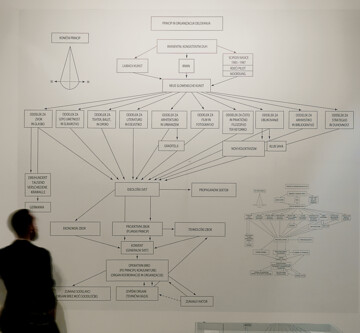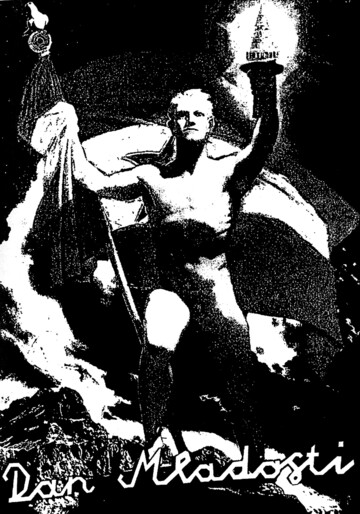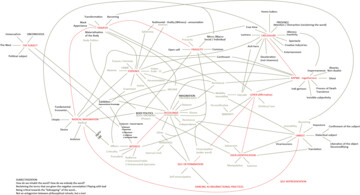The treatment of the subject in contemporary art could be said to have been inherited from the avant-garde disagreement with the modernist notion of the autonomous subject. Besides opposing any subject unrelated to the circumstances of life, today’s art draws attention to the cynicism of the system feeding off parasitically from the very criticism of the circumstances it itself produces.
The Neue Slowenische Kunst collective (NSK – New Slovene Art) took up a reckoning with the cynical socialist government at the beginning of the 1980s, just after Tito’s death. By then, all that remained was pretence of believing in the system, which had started to collapse. As the system was falling apart, new subjectivities started to form; no one believed in the myth of the socialist worker and in the collective spirit any longer.
Slavoj Žižek characterised NSK’s approach to issues of subjectivity as “over-identification”. He gave his first clear exposition of this topic in the 1993 essay “Why are Laibach and NSK not Fascists?” There he made note, among other things, of the misgivings of leftist critics, who had supported NSK and Laibach, but in some cases with uneasiness or uncertainty: what if the artists were serious after all, what if their performance of totalitarian types was taken seriously by the audience? The uneasiness would not have arisen if Laibach and NSK had exhibited clear, unambiguous critical distance in their work, since, as Žižek says, uneasiness stems from the assumption that ironic distance is automatically subversive. Yet he already warned at the time that ironic distance from the system had become the condition for the functioning of the system itself. “In this sense the strategy of Laibach appears in a new light: it ‘frustrates’ the system (the ruling ideology) precisely insofar as it is not its ironic imitation, but over-identification with it – by bringing to light the obscene superego underside of the system, over-identification suspends its efficiency.”
NSK performed an over-identification with the symbolic order that was falling apart in the 1980s and whose participants only pretended to be believers, in a manner similar to today’s peddlers of authentic experience pretending to offer authenticity, even while it is clear that this is a sham act from which they are cynically distanced. What the NSK groups targeted in the 1980s was less the totalitarianism of a concrete system than this system’s cynicism. This cynicism, however, has by now become dominant, total, and yet this totalitarianism now goes perfectly unnoticed, disguised under the appearance of a free critical subject.





